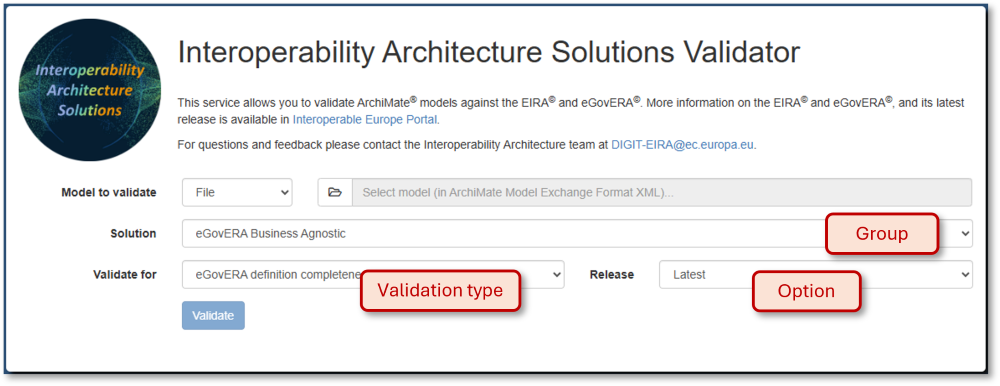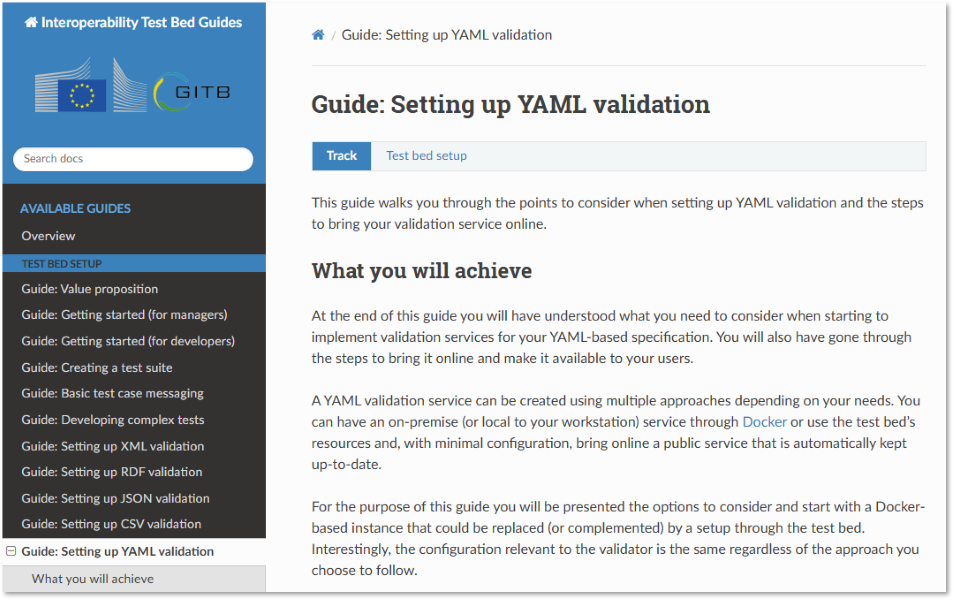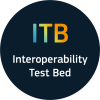
A new milestone release (1.8.0) is now available for the Test Bed’s RDF, XML, JSON and CSV validators.

Release 1.8.0 is now the latest available milestone release for the Test Bed’s RDF, XML, JSON and CSV validators. Milestone releases complement the validators’ continuous delivery model that provide rapid access to latest changes, by offering stable versions for users hosting validators on their own infrastructure. The highlights of this latest release are summarised below.
Validation type groups
To better support validators covering different sets of specifications, it is now possible to define validation type groups as an additional hierarchical level above validation types. Each group defines a set of related validation types, which in turn may include zero or more options, to fine tune the validation. Presentation-wise, groups can either be presented as a separate selection list (as in the example below from the Interoperability Architecture Solutions Validator), or as grouping labels inline with the validation types.

Similar to validation types and options, groups can be set with custom labels that can also be translated for the validator’s supported languages.
YAML validation support
JSON validators can now be configured to validate YAML content based on configured or user-provided JSON schemas. YAML validation can be strict, requiring YAML to be provided as input, or flexible in supporting both YAML and JSON. Furthermore, JSON-related features such as the preprocessing of inputs based on JSON Path, can also be applied to YAML, with the validator automatically converting from YAML to JSON for the processing, before reconverting back to YAML for the validation and reporting.
Complementing the support for YAML, the Test Bed team also published a generic YAML validator, for validation of arbitrary YAML based on user-provided JSON Schemas, as well as a YAML validation guide for the configuration of validators focusing specifically on YAML.

Minor improvements
Besides its main highlights, this release also includes additional minor improvements:
- XML validators with XSD and Schematron artefacts can now be configured to continue with Schematron validation even in case of XSD errors.
- SVG images are now used in PDF reports to address aliasing issues.
- JSON validator report messages have been improved for better consistency.
- Multiple third party libraries have been upgraded, to benefit from their latest patches.
- Several minor bugs reported by users have been resolved.
The full list of improvements and bug fixes is available in each validator’s change history documentation (see for RDF, XML, JSON and CSV).
Validator release references
The table below provides the relevant reference links for each validator. For the detailed list of updates introduced by the latest release check the change history links.
| Validator | Docker Hub image | Documentation links |
|---|---|---|
| RDF validator | isaitb/shacl-validator | RDF validation guide | Change history |
| XML validator | isaitb/xml-validator | XML validation guide | Change history |
| JSON validator | isaitb/json-validator | JSON validation guide | Change history |
| CSV validator | isaitb/csv-validator | CSV validation guide | Change history |
Remember that you can automatically receive updates for new milestone releases by either subscribing to the Test Bed community and configuring your notification preferences, or by subscribing to the validators’ GitHub repositories.
Find out more
Further information on the Test Bed's validators as well as step-by-step usage and configuration instructions are available in their respective validation guides (for XML, RDF, JSON, CSV and YAML). General details on the Test Bed's services and use cases can be found in the Interoperable Europe Portal, with its value proposition being a good starting point for newcomers. To receive updates on Test Bed news and releases remember to subscribe to the Test Bed on the Portal, and to follow Interoperable Europe’s updates on X and LinkedIn.
The Interoperability Test Bed is a service provided by the European Commission’s DIGIT, offering conformance testing and validation solutions in support of IT systems’ cross-border interoperability.
Referenced solution


